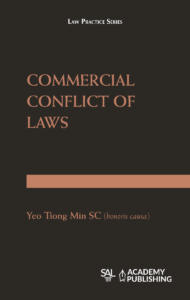Views
Torture, Universal Civil Jurisdiction and Forum Necessitatis: Naït-Litman v. Switzerland before the ECtHR
On March 15 the ECtHR, sitting as the Grand Chamber,decided on the Naït-Litman v. Switzerland case (application no. 51357/07), against the applicant and his claim of violation of Article 6 ECHR. Independently on whether one agrees or not with the final outcome, for PIL lawyers and amateurs the judgment (for very busy people at least the press release) is certainly worth reading. Read more
The Pitfalls of International Insolvency and State Interventionism in Slovenia
Written by Dr. Jorg Sladic, Attorney in Ljubljana and Assistant Professor in Maribor (Slovenia)
The most interesting development in European private international law and European insolvency law seems the Croatian AGROKOR case. Rulings of English courts have been reported (see e.g. Prof. Van Calster’s blog, Agrokor DD – Recognition of Croatian proceedings shows the impact of Insolvency Regulation’s Annex A.)[1] However, a new and contrary development seems to be an order by the Slovenian Supreme Court in case Cpg 2/2018 of 14 March 2018.[2] Read more
Krombach: The Final Curtain
Readers of this blog may be interested to learn that the well-known (and, in many ways, quite depressing) Krombach/Bamberski saga appears to have finally found its conclusion with a decision by the European Court of Human Rights (Krombach v France, App no 67521/14) that was given yesterday. Read more
News
New Book: “Commercial Conflict of Laws” by Yeo Tiong Min
Professor Yeo Tiong Min (Singapore Management University – Yong Pung How School of Law) has recently published a seminal book entitled “Commercial Conflict of Laws” (Academy Publishing, 2023).

The book aims to introduce readers to “the concept, principles and techniques of the common law of Singapore in dealing with problems in the conflict of laws, with an emphasis on cross-border commercial transactions” (p. v). The book consists of 14 chapters dealing with the core issues of private international law (conflict of laws), i.e. international jurisdiction (Chapters 2 to 7), foreign judgments (Chapters 8 to 10) and choice of law (Chapters 11 to 14).
New Article published in American Journal of Comparative Law
On 11 August 2023, the American Journal of Comparative Law, published an article online titled: Jan Kleinheisterkamp, “The Myth of Transnational Public Policy in International Arbitration” The abstract reads as follows:
This Article traces the concept of transnational public policy as developed in the context of international arbitration at the intersection between legal theory and practice. The emergence of such a transnational public policy, it is claimed, would enable arbitrators to safeguard and ultimately to define the public interests that need to be protected in a globalized economy, irrespective of national laws. A historical contextualization of efforts to empower merchants and their practices in Germany and the United States in the nineteenth and early twentieth centuries highlights their reliance on the mythical lex mercatoria that shaped English commercial law. Further contextualization is offered by the postwar invocation of “general principles of law recognized by civilized nations,” to keep at bay the application of supposedly less civilized, parochial legal orders, and by the consequent emergence of the “new” lex mercatoria as conceptualized especially in France. These developments paved the way, on the theory side, for later conceptualizations of self-constitutionalizing law beyond the state, especially by Gunther Teubner, and, on the practice side, for the notion of transnational public policy developed by arbitrators, especially by Emmanuel Gaillard, culminating in jurisprudential claims of an autonomous arbitral legal order with a regulatory dimension. In all these constructions, the recourse to comparative law has been a crucial element. Against this rough intellectual history, the Article offers a critique of today’s construction of transnational public policy by probing into its constitutional dimension and the respective roles of private and public interests. This allows, in particular, to draw on parallels to historic U.S. constitutional debates on the allocation of regulatory powers in federalism.
6-month Internship Opportunity in The Hague
2024 applications for a 6-month internship in The Hague, Netherlands are now open for Australian law school graduates

The Australian Institute of International Affairs and the Australian Branch of the International Law Association call for applications for the 2024 Peter Nygh Hague Conference Internship.


